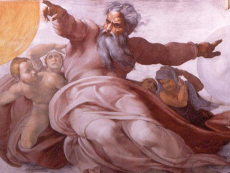
Email: reecejordan98@hotmail.co.uk
Total Article : 168
About Me:18-year-old sixth form student, studying English Literature, History and Government and Politics. My articles will broadly cover topics from the current affairs of politics to reviews of books and albums, as well as adding my own creative pieces, whether it be short fiction or general opinion.

The kernel of the problem of representing God in Paradise Lost, however, is Milton’s God himself. As Goldberg and Orgel state that ‘what ought to be the strongest and most comforting voice in the poem – God’s – turns out to be the most problematic.’ This is not least because, as William Empson states, Milton’s ‘God has in any case an authoritarian character’. In Book 2, Mammon speaks of God and Heaven as if in a totalitarian regime: ‘Strict laws imposed, to celebrate his throne / With warbled hymns, and on his godhead sing / Forced hallelujahs’ (Book 2, ll. 241-243). One would be forgiven for dismissing such a claim coming from the mouth of a rebel angel who has just been banished to hell as mere fabrication. That would be unless Milton’s God did not fit this pre-formed description. After God’s speech in Book 3, Milton provides an unnervingly ambiguous scene: ‘No sooner had the almighty ceased, but all / The multitude of angels with a shout / Loud as from numbers without number, sweet / As from blest voices, uttering joy, heaven rung / With jubilee, and loud hosannas filled / The eternal regions’ (Book 3, ll. 344 – 349). At first it reads as a celebration of God’s word, but it soon seems to be excessive, sycophantic almost. Just as the tears of North Koreans were met with a sceptical eye after the death of Kim-Jong-Il in 2011, so too do the actions of the angels here. One senses that these hosannas may, indeed, be ‘forced’.
Not only does God seem tyrannical but his creations seem imperfect. Whilst God comments on Adam and Eve being ‘in blissful solitude’ (Book 3, l. 69), we later realise that this was not always the case. Before Eve is created ‘Adam finds his solitude intolerable, and asks God for a companion. We are naturally incomplete, unsatisfied; God created us this way.’ Adam’s reasoning for such is that, ‘in thyself [God] art perfect, and in thee / Is no deficience found; not so is man’ (Book 7, ll. 415-416).Thus, Milton draws attention to the fact that human beings were not only flawed in their postlapsarian state, but before the fall itself. This is why the ‘charge that Adam is an ‘ingrate’ is particularly unattractive because… it refuses to acknowledge that there are any reasons why one might do the wrong thing… and from God’s point of view, there are indeed none.’ Thus, God is not only a tyrannical figure in terms of how he rules Heaven, but also in how he creates an imperfect being and yet is blind to their flaws.
Image Credits: independent.co.uk

0 Comment:
Be the first one to comment on this article.